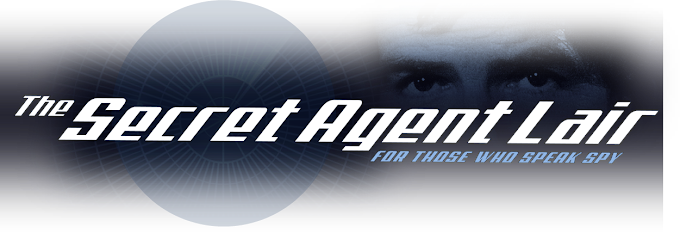A man wakes up to a
noisy alarm clock at 8 am. He puts on his glasses to correct his myopia.
Prepares some coffee, gets dressed in a decent-looking grey suit and takes a
look at the horse racing results on the newspaper. He makes his bed, where he finds
a cheap-looking diamond imitation necklace (perhaps from some “company” he had
a while ago). As he tidies the sheets, a Mauser handgun can be seen hidden,
which immediately makes us connect this urbane middle-class man with a man of
danger.
This is the beginning
of 1965’s The Ipcress File, directed
by Sydney J Furie, produced by Harry Saltzman and starring Michael Caine as
Harry Palmer, the protagonist of the Len Deighton novel of the same name
(although his identity remained anonymous in the source book). As we join Harry
during a common pre-work breakfast session, the film’s credits are displayed
and John Barry’s catchy theme tune (aptly titled “A Man Alone”) is played. A
mix of jazzy trumpets and wind instruments feel like a strange mix of urbanity with
mystery, two words that fit our leading man very well.
It appears a “brain
drain” has been going on in Great Britain: physicists who disappear or leave
the country in the peak of their career. Dr Radcliffe (Aubrey Richards) is the
last name in the list of missing experts, so Colonel Ross (Guy Doleman)
transfers the “insubordinate and insolent” Sergeant Palmer to an intelligence
section dedicated to investigate the whereabouts of Radcliffe and the threat
behind the missing physicists, led by one Major Dalby (Nigel Green). While
Dalby has a preference for bureaucratic leg work, the disobedient Palmer
prefers to tackle his sources and have a more direct approach to the job in
hand.
More than five decades
after its release, The Ipcress File
continues to be a gem among the spy fiction world. It’s very representative of
the 1960s but its influences can still reach relatively recent productions: the
brainwash scene has been imitated in a chapter of 1988’s Noble House and some shots of the initial confrontation between
James Bond and bent MI6 section chief Dryden in 2006’s Casino Royale were strongly inspired by this film, as director
Martin Campbell said.
By the time this film
was released, James Bond was at his high with the release of Thunderball, who made the character a
popular myth. But while Bond was what every man wanted to be and couldn’t get
to be, a man surrounded of the finest things and travelled to the most exotic
places, Harry Palmer was almost his exact opposite: a man that we all could
very well be, someone with a dull and rather monotonous life.
We see Bond and we know
he’ll win, we see Palmer and we doubt if he’ll reach that far: both Dalby and
Ross have some contempt for his intelligence, however, he saves the day thanks to his ingenuity and improvisation when locked and
brainwashed by the opposition.
Visually, the film is a
masterpiece: cinematographer Otto Heller knows how to balance the colour
palette (the visuals are colourful or desaturated when needed), take full advantage
of the width of the lens and provide some clever shots of people who you barely
payed attention is spying at the leading characters. John Barry’s soundtrack is
among his finest albums ever released: the title tune is repeated often in
different versions, although some tracks are filled of enigmatic cues for the
scene Palmer is tortured by starving and imprisonment before he gets the
Ipcress treatment.
Action is not abundant throughout
the film, although there’s quite a lot of suspense and thrills as well as the
minefield of treachery the somewhat innocuous Palmer has to go through, with both
Ross and Dalby blaming (and framing) each other until his wits and reflex acts
lead him to the truth. Much like he did for the Bond films, Peter Hunt’s
editing is key to ensure an entertaining pace to the film and to show the key
moments in a clever way -notice at the assassination of one of Palmer’s friends
as he waits for the red traffic lights to turn green- or to give a faster pace
to the many days where Palmer is captured, tortured and imprisoned in a place
we are meant to believe is Albania – once again, a huge set by another Bond
genious, Ken Adam.
Director Sidney J.
Furie and screenwriters W.
H. Canaway and James
Doran delivered a fantastic film, a product that goes from an investigative
story to an intricate spy movie filled of suspense and some humour when needed.
The Ipcress File is a good testimony
for a film where all the key elements of a movie are well blended and the goal is achieved with great success.
Nicolas Suszczyk




